-
 bitcoin
bitcoin $87959.907984 USD
1.34% -
 ethereum
ethereum $2920.497338 USD
3.04% -
 tether
tether $0.999775 USD
0.00% -
 xrp
xrp $2.237324 USD
8.12% -
 bnb
bnb $860.243768 USD
0.90% -
 solana
solana $138.089498 USD
5.43% -
 usd-coin
usd-coin $0.999807 USD
0.01% -
 tron
tron $0.272801 USD
-1.53% -
 dogecoin
dogecoin $0.150904 USD
2.96% -
 cardano
cardano $0.421635 USD
1.97% -
 hyperliquid
hyperliquid $32.152445 USD
2.23% -
 bitcoin-cash
bitcoin-cash $533.301069 USD
-1.94% -
 chainlink
chainlink $12.953417 USD
2.68% -
 unus-sed-leo
unus-sed-leo $9.535951 USD
0.73% -
 zcash
zcash $521.483386 USD
-2.87%
Is Bitcoin mining anonymous?
Bitcoin mining offers pseudonymity, but privacy can be compromised through blockchain analysis, KYC exchanges, IP tracking, and data from mining pools.
Nov 06, 2025 at 12:15 am
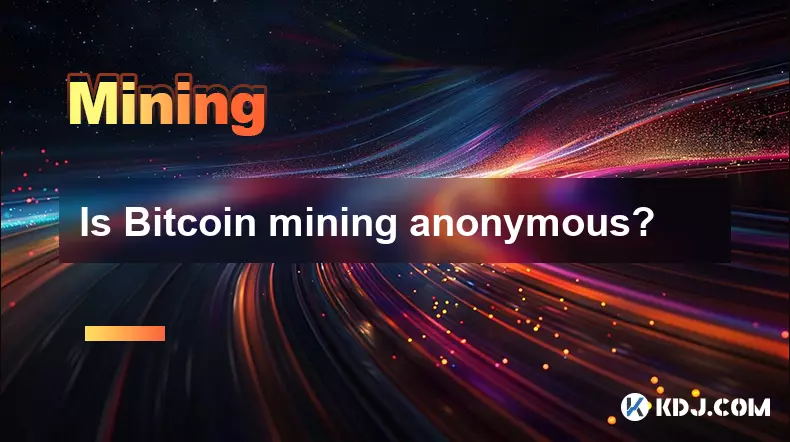
Understanding Bitcoin Mining and Privacy
1. Bitcoin mining is the process through which new transactions are verified and added to the blockchain. Miners use powerful computers to solve complex cryptographic puzzles, earning newly minted bitcoins as a reward. While this system ensures decentralization and security, it does not inherently guarantee anonymity for participants.
2. Every mining activity is recorded on the public ledger known as the blockchain. This includes the transaction outputs associated with mining rewards. Although miner addresses do not contain personal information by default, their behavior on the network can be analyzed to potentially reveal identities.
3. When miners withdraw their earnings into exchanges or convert them into fiat currency, they must often comply with Know Your Customer (KYC) regulations. This step creates a direct link between a blockchain address and a real-world identity, undermining any assumed privacy.
4. Network-level tracking also poses risks. Internet Service Providers (ISPs) and other observers can monitor the IP addresses of nodes participating in mining. If proper precautions like Virtual Private Networks (VPNs) or Tor are not used, an observer could associate a specific mining operation with a physical location.
5. Pool mining further complicates anonymity. Most miners join pools to increase their chances of earning consistent rewards. However, pool operators collect data about contributors, including payout addresses and hash rates. This centralization of data increases the risk of exposure if the pool operator is compromised or required to disclose information.
The Role of Addresses in Miner Anonymity
1. Bitcoin addresses used in mining are pseudonymous rather than anonymous. They act as public identifiers that anyone can inspect through blockchain explorers. Reusing addresses or linking them across services makes it easier for analysts to trace funds back to individuals.
2. Advanced blockchain analysis firms employ clustering techniques to group addresses believed to belong to the same entity. By observing transaction patterns, change outputs, and service usage, these companies can de-anonymize users even without direct access to personal data.
3. Some miners attempt to enhance privacy by using fresh addresses for each payout and avoiding centralized exchanges. However, maintaining true anonymity requires disciplined operational security, including isolated wallets, non-custodial tools, and careful metadata management.
4. Techniques such as CoinJoin can help obscure the origin of mined coins, but they are rarely integrated directly into mining workflows. These methods require active participation and coordination, making them less accessible for average miners focused on profitability.
5. The transparency of the Bitcoin network means that all actions leave a permanent record. Once an address is linked to an identity—even indirectly—past and future activities tied to that address become exposed.
Risks Associated with Public Mining Pools
1. Joining a public mining pool often requires registering an email address or API key. Even if no formal identification is submitted, this digital footprint can be correlated with other online behaviors to identify the miner.
2. Pool operators maintain logs of hash contribution, payout history, and connected devices. In jurisdictions where law enforcement requests data, these records may be handed over, especially if illegal activity is suspected.
3. Centralized pools create single points of failure for privacy. A breach at the pool level could expose thousands of miners’ payout addresses and IP information simultaneously.
4. Some pools offer enhanced privacy features, such as support for Tor connections or anonymous registration. However, these options are limited and not widely adopted due to usability trade-offs.
5. Solo mining eliminates reliance on third-party pools but demands significant computational resources. Only large-scale operations can viably pursue this route, and even then, network-level surveillance remains a threat.
Frequently Asked Questions
Can someone trace a Bitcoin miner through their reward address?Yes, blockchain analysis tools can track transactions from a mining reward address. If that address interacts with a KYC-regulated exchange or service, the owner's identity can be uncovered.
Does using a VPN make Bitcoin mining anonymous?
A VPN hides your IP address from public view, reducing network-level tracking. However, it does not protect against blockchain analysis or leaks from mining pools or exchanges.
Are there truly anonymous mining methods available?
Complete anonymity is difficult to achieve. Using decentralized pools, Tor, fresh addresses, and non-KYC exchanges improves privacy, but each step introduces complexity and potential failure points.
Do hardware choices affect mining anonymity?
Hardware itself doesn’t reveal identity, but purchasing ASICs with tracked payment methods or registering devices online can create links to personal information.
Disclaimer:info@kdj.com
The information provided is not trading advice. kdj.com does not assume any responsibility for any investments made based on the information provided in this article. Cryptocurrencies are highly volatile and it is highly recommended that you invest with caution after thorough research!
If you believe that the content used on this website infringes your copyright, please contact us immediately (info@kdj.com) and we will delete it promptly.
- Blockchains, Crypto Tokens, Launching: Enterprise Solutions & Real Utility Steal the Spotlight
- 2026-01-31 12:30:02
- Crypto Market Rollercoaster: Bitcoin Crash Recovers Slightly Amidst Altcoin Slump and Lingering Fear
- 2026-01-31 13:10:01
- Solana's Stumble and APEMARS' Rise: Crypto Investors Navigate Volatile Markets
- 2026-01-31 13:05:01
- Bitcoin Options Delta Skew Skyrockets, Signaling Intense Market Fear Amidst Volatility
- 2026-01-31 13:00:02
- Cardano Secures Tier-One Stablecoin: USDCX Arrives Amidst Global Regulatory Push
- 2026-01-31 13:00:02
- A Shining Tribute: Oneida Woman, Washington's Army, and the New $1 Coin
- 2026-01-31 12:55:01
Related knowledge
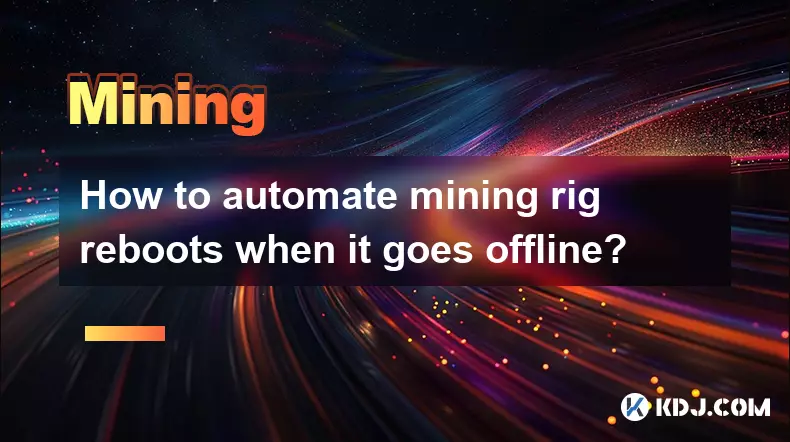
How to automate mining rig reboots when it goes offline?
Jan 23,2026 at 11:00pm
Monitoring System Integration1. Deploy a lightweight agent on the mining rig’s host OS that continuously reports hash rate, GPU temperature, and pool ...

What are the tax implications of cryptocurrency mining?
Jan 23,2026 at 02:40am
Tax Treatment of Mining Rewards1. Cryptocurrency received as a reward for mining is treated as ordinary income by the IRS at the fair market value on ...
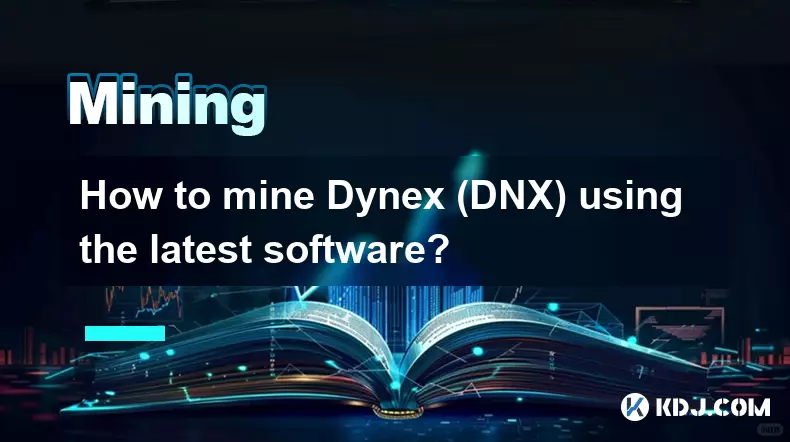
How to mine Dynex (DNX) using the latest software?
Jan 22,2026 at 10:00am
Understanding Dynex Mining Fundamentals1. Dynex (DNX) operates on a proof-of-work consensus mechanism optimized for neuromorphic computing workloads, ...
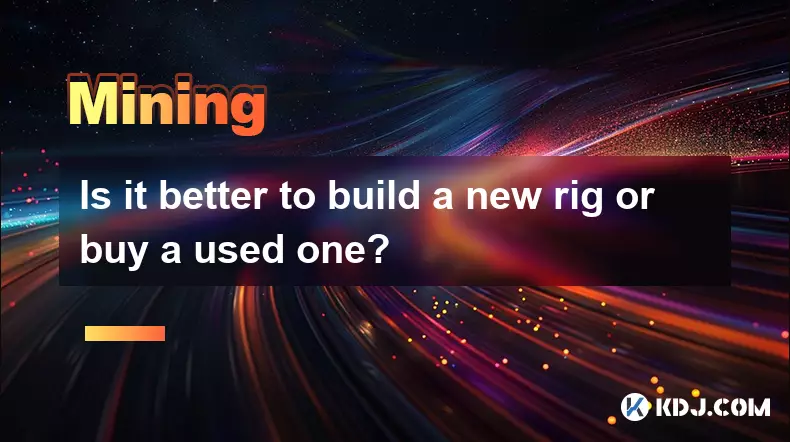
Is it better to build a new rig or buy a used one?
Jan 24,2026 at 10:20pm
Cost Efficiency Analysis1. New mining rigs come with manufacturer warranties, typically covering components for one to three years. This assurance red...
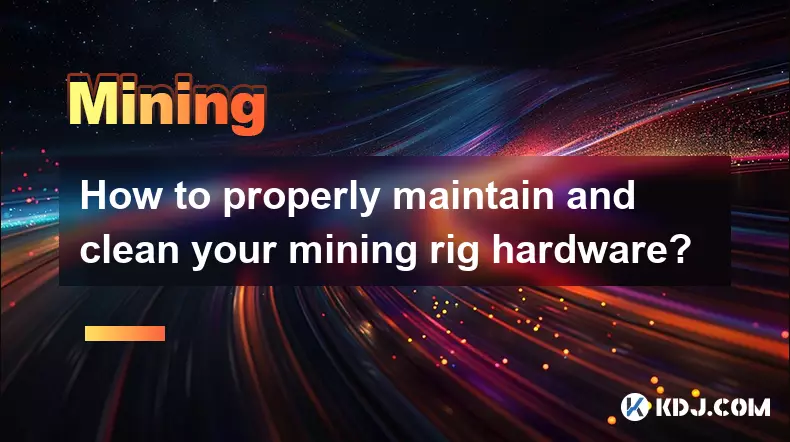
How to properly maintain and clean your mining rig hardware?
Jan 19,2026 at 11:00am
Cooling System Inspection and Optimization1. Dust accumulation inside fans and heatsinks directly reduces thermal dissipation efficiency, leading to h...
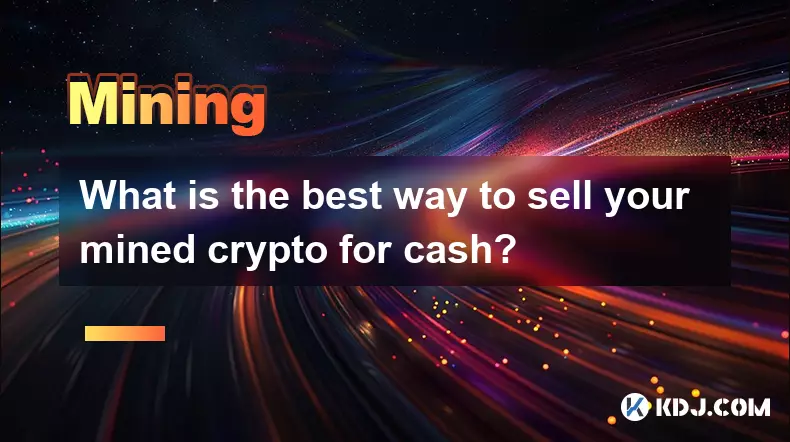
What is the best way to sell your mined crypto for cash?
Jan 20,2026 at 02:59am
Choosing the Right Exchange Platform1. Select an exchange with strong regulatory compliance and a proven track record of secure withdrawals. Platforms...

How to automate mining rig reboots when it goes offline?
Jan 23,2026 at 11:00pm
Monitoring System Integration1. Deploy a lightweight agent on the mining rig’s host OS that continuously reports hash rate, GPU temperature, and pool ...

What are the tax implications of cryptocurrency mining?
Jan 23,2026 at 02:40am
Tax Treatment of Mining Rewards1. Cryptocurrency received as a reward for mining is treated as ordinary income by the IRS at the fair market value on ...

How to mine Dynex (DNX) using the latest software?
Jan 22,2026 at 10:00am
Understanding Dynex Mining Fundamentals1. Dynex (DNX) operates on a proof-of-work consensus mechanism optimized for neuromorphic computing workloads, ...

Is it better to build a new rig or buy a used one?
Jan 24,2026 at 10:20pm
Cost Efficiency Analysis1. New mining rigs come with manufacturer warranties, typically covering components for one to three years. This assurance red...

How to properly maintain and clean your mining rig hardware?
Jan 19,2026 at 11:00am
Cooling System Inspection and Optimization1. Dust accumulation inside fans and heatsinks directly reduces thermal dissipation efficiency, leading to h...

What is the best way to sell your mined crypto for cash?
Jan 20,2026 at 02:59am
Choosing the Right Exchange Platform1. Select an exchange with strong regulatory compliance and a proven track record of secure withdrawals. Platforms...
See all articles





















![Ultra Paracosm by IlIRuLaSIlI [3 coin] | Easy demon | Geometry dash Ultra Paracosm by IlIRuLaSIlI [3 coin] | Easy demon | Geometry dash](/uploads/2026/01/31/cryptocurrencies-news/videos/origin_697d592372464_image_500_375.webp)




















































